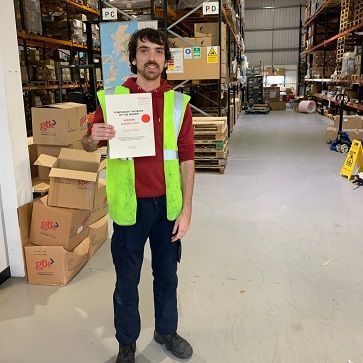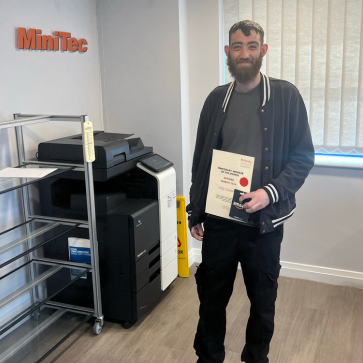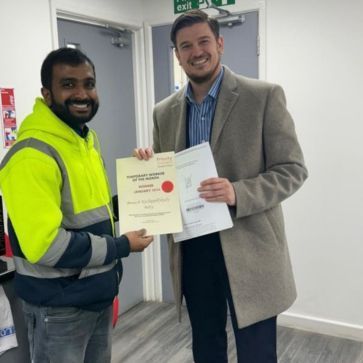A CV can tell you about a candidate’s work experience, education, skillset and whether or not they use a spellchecker!
But here are five essential things you need to know about a candidate that you won’t be able to find on their CV.
Call our friendly team on 01256 334575

What do the flying machine and the CV have in common? They were both invented by Leonardo Da Vinci! Yes, CVs really have been around since 1482 and we have Leonardo to thank for it!
They became a formal part of the job application process in the 1950s and have been a fundamental part of it ever since.
CVs remain a really important and useful tool for a recruiter, but they are just the start of the story. They tell us a lot about a candidate and are a useful aid to create a shortlist.

A CV can tell you about a candidate’s work experience, education, skillset and whether or not they use a spellchecker!
But here are five essential things you need to know about a candidate that you won’t be able to find on their CV.
1. Work ethic
A strong work ethic is one of the most sought-after qualities a candidate can possess. It’s demonstrated by professional behaviour, determination to get the job done, ability to work as part of a team, being organised and producing high-quality work.
To find out more about a candidate’s work ethic, you can screen them with a telephone call or invite them for an initial interview, asking questions to understand how they would theoretically respond in circumstances that would reveal their work ethic. Questions about their previous work experiences and behaviour can also provide a great insight.
Ask questions such as:
Perhaps the most revealing way to discover a candidate’s work ethic is to give them a trial work period.
2. Values and motivations
It’s so important that the values of employer and employee align for long-term success. If values are out of sync, or in opposition even, this could lead to issues in the short and long-term.
Understanding what is really important to a candidate and motivates them, be it money, a work/life balance, flexibility or something else, can help determine whether they will fit in and thrive.
A CV might give you a little insight into their values and motivations but it could also have you making incorrect assumptions. It’s best to have a conversation with a candidate on the phone or in person to find out what really drives them.
Ask value-based questions such as:
3. Personality and culture fit
A candidate’s personality is crucial to understanding if they would be a good fit for the company culture. A mismatch could have far reaching and long term consequences.
CVs aren’t great mediums for expressing personality. But it’s vital that you learn about a candidate’s personality to understand if they would be a good fit for the company culture.
Having an in-person interview is a great way to learn more about candidate’s personality. Making small talk as well as asking some direct questions can reveal a lot about them.
Ask questions such as:
4. Salary expectations
You can get an impression from a candidate’s work history on their CV of a salary they might be anticipating, however, they may be looking for a position with a better work/life balance and actually expect to take home a lower salary than they have previously. A read of their CV might lead you to believe that they’re looking to move up a pay grade but communicating directly with them, could clarify the matter.
If a candidate is applying for a position at a higher pay grade than their previous job, it’s also important to understand what they can bring to the role that surpasses their contributions in their previous role.
It’s easy to draw conclusions but an actual conversation with the candidate will better help you understand their salary expectations.
During a telephone or video call, tell the candidate the salary range for the job and ask if this is an acceptable level of pay for them.
If you’re not convinced the candidate’s salary expectations are a match for the role, ask the following questions:
5. Appearance and presentation
You might receive the occasional passport photo attached to a candidate CV but including an image of yourself isn’t the norm in the UK.
Knowing how someone presents themselves is important to see how professionally they dress, and whether or not they would be a good fit with a company.
A pre-interview video call using Skype or Zoom is a useful and efficient tool for getting to know the candidate and finding out how they present themselves in a professional situation.
Phone, video calls and initial interviews are the best ways to find out these five essential pieces of information but to get the greatest benefit, it requires time. If you’re pressed for time or don’t have the resources to find great candidates in-house, it’s well worth outsourcing to an experienced recruitment agency such as Priority Appointments.
Email us at office@priorityappointments.co.uk or call us on 01256 334575 and one of our friendly and professional team will be very happy to help!



© 2015 - 2024 Priority Appointments
Privacy
|
Terms |
Cookies
|
Site Map
|
Modern Slavery Policy
Powered with ❤️ by Shazamme